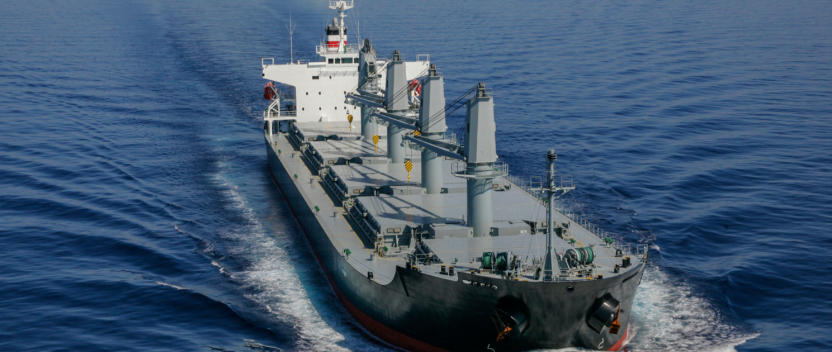Full speed ahead and damn the torpedoes

Inmarsat Maritime President Frank Coles is a man on a mission. Not known to be either shy or retiring, he combines the kind of physical presence and force of argument required to push through a project as potentially transformative as Global Xpress.
Inmarsat Maritime President Frank Coles is a man on a mission. Not known to be either shy or retiring, he combines the kind of physical presence and force of argument required to push through a project as potentially transformative as Global Xpress.
The operator’s new set of satellites, colloquially known as GX, are a $2bn bet on the of maritime communications, ushering in the era of ‘High Throughput Satellite’ in shipping, bringing higher capacity and faster connections on a global basis. Inmarsat is not the only player gunning for the maritime market – rival Iridium will spend $2.5bn on its own new services – but Coles believes his company is uniquely well-placed to meet the need.
Trouble is, Coles thinks shipping isn’t moving fast enough to capture the opportunity that GX will deliver by the time it is fully functional in the next two to three years. With the industry still contending with a patchy recovery, high fuel prices, outdated working practices and an increasing regulatory burden, the opportunity is clear, at least to him.
Giving the keynote at the recent ‘Smart Ship’ session at the CMA Shipping 2014 conference, Coles traded the usual sales pitch for an approach that challenged owners, operators and managers to embrace the new era.
“By some estimates, in 2020 there will be 50 billion things connected to the internet. Surely the time is right for shipping to move in this direction?” he asked. “Ashore we have power stations, wind farms and hospitals, where the machines are connected, where the data is sifted, where the mind is meeting the machine and sensible decisions are made.”
Ships, Coles argues, are ever more like mini-cities or modern factories, in which main engines, generators, water-processing machines, cargo and navigation systems can be equipped with sensors to provide valuable data. In some cases this data is already being collected but it still needs to be validated and analysed so that intelligent business decisions can be made.
There are innovators in the market of course, notably manufacturers of equipment and systems who are embedding sensor and M2M technology to move from failure-based maintenance to predictive routines based on real-time monitoring. Remote maintenance offerings are extending to shipyards too, which understand that differentiation requires them to offer a service that improves the owner’s experience and their bottom line.
“So we find ourselves at a place where in 2014, we perhaps have the ‘digital ship’. Many ships have sensors onboard. But come 2020, we will not have a digital ship but a smart ship, one with fully intelligent global maintenance and repair, monitored from ashore,” he said. “A ship that can be run with fewer crew and be monitored in a much more effective way ashore. Why is this going to happen? It’s going to happen because technology and communications are moving faster and faster.”
Blocking wider adoption, he believes, is a deep-seated resistance among shipowners to paying more than the bare minimum for communications and IT. Ashore, we already take high speed communications for granted, “but onboard we still fight for every penny, without realising the value that it can bring”.
The need to align all the stakeholders, he argues, is where the roadblocks begin. While shipowners, managers and charterers, class and risk interests, vendors and manufacturers share some common safety aims, they can be said to differ on almost everything else, certainly anything commercial.
Complicating the picture further is the lack of unified standards, with vendors delivering products to their own designs and many relying on their own interpretations of regulations in pursuit of competitive edge. “Until we align the stakeholders such as the engine-makers, the navigation equipment suppliers and the other providers, we will continue to have hold-ups,” he adds.
His criticism extends to shipping’s principal regulator, the IMO, an organisation which he accepts ‘has done great things for our industry’. The problem, he says is that IMO is “populated almost entirely by immigrants of the internet world. This necessarily means that tradition is a badge of honour and caution is their war cry”.
Such an approach is hardly conducive to innovative thinking, he suggested. And because the industry is so poorly understood by non-experts, the risk is that the smart ship of the future will be nothing of the sort, but rather a concept dictated to the industry by regulatory bodies in the wake of an accident.
“This ties to our culture, the fact that we are so traditional, to some extent closed-minded about advances and unprepared to take even small risks in communications and technology. Although it is changing, we are immigrants to the internet culture and we need more natives involved.”
Coles accepts there are companies and organisations populated with internet natives but he thinks owners fear the impact of floods of data streaming ashore. However, he believes ‘new model shipping’ may not even require the owner to look at the data until it has been sifted and interpreted by domain experts from the equipment manufacturers themselves, removing a burden for a reasonable return.
And in his view, the commercial driver is too compelling to ignore. The convergence of shipbuilding and IT could, he says, be worth of billions of dollars to the global industry. Its proponents insist that monitoring ships to run them smarter holds the promise of generating billions more. The simplest levels of data collection and analysis can deliver a million dollars per ship in savings from predictive monitoring, according to some providers.
“As Stephen Schwartz of ABS Nautical Systems neatly puts it, ‘the future of operational optimisation and regulatory compliance will be in the ability to collect, analyse and act upon real time data’. And the most important reason why is because the natives of the internet world demand it. Tomorrow’s ship’s staff will demand a smarter ship,” he adds.
At a recent industry event in Hong Kong, Coles says he was flabbergasted to hear the suggestion that sending crew fewer emails was the way to ease the burden of paperwork. Surely it would be better he argues to retire paper log books and data entry into spreadsheets. “We need to give today’s seafarer the tools of the modern world. That will enable the crew and the ship to operate in a more effective way.”
That requires industrial quality communications, something the industry has conspicuously lacked until recently. Without that, he adds, “we might as well just be immigrants”.
Naturally as the incumbent communications provider, Inmarsat has some skill in this game. But for Coles at least, it’s a game that is already afoot. Not to play would be the most foolish policy of all.
“We are in a new world. The technology is here already, the communications are coming. The efficiency is there for all of us to see. The natives want it, the immigrants are holding it up. The question is, for how long do we let them dictate the pace of evolution?”


